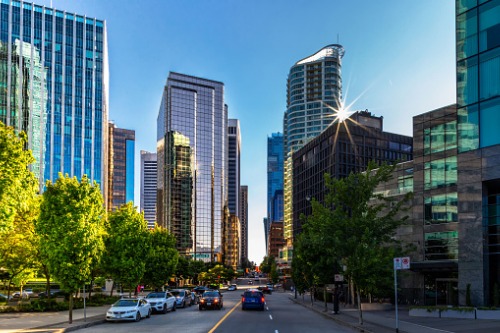Some sectors finished strong, while others continue to struggle

While exhibiting renewed activity in the fourth quarter, commercial real estate investment in Vancouver has yet to return to its pre-pandemic vibrancy, largely due to the lethargic office and residential land sectors.
“As the one-year mark of the pandemic lockdown nears, strong results in Q4 2020 have generated positive momentum moving into 2021,” Altus Group said in its recent market report. “While there was increasing investment in the retail, apartment and industrial sectors, the ultimate pandemic impact on the office sector remains to be seen and developers have adopted a tentative approach to land acquisition when it comes to residential land.”
Total transaction volume for 2020 reached $7.9 billion, representing a 15% decline from the $9.3 billion invested in 2019. The number of transactions also fell by 8% to 1,421, despite the retail, industrial, and apartment sectors attempting to offset the weaknesses of other segments.
Retail posted “a surprisingly strong finish” to 2020, with an 18% increase in total investment from the year prior.
“Despite COVID-19 restrictions in place across the country, many retailers have remained open for business in British Columbia, which appears to have had a positive effect on this asset class,” Altus said. “Rising apartment vacancy rates led to increased availability for multi-family assets in the Vancouver market area which resulted in apartment sales surpassing the $1 billion mark in 2020, marking a 30% increase year-over-year.”
The industrial segment proved to the highest selling asset class of the year in Vancouver, growing by 34% annually and comprising 22% of the total dollar volume in 2020.
“Availability rates in this space remain low, with the emergence of e-commerce and food delivery businesses driving increased demand for warehousing and storage facilities,” Altus reported.
Meanwhile, the largest decline was seen in the office sector, with sales plummeting by 60% year over year and the total dollar volume failing to surpass the $1-billion threshold for the first time since 2015.
“As COVID-19 uncertainties and work from home mandates persisted through the fourth quarter, increasing office vacancy rates left investments in this sector at a standstill,” Altus said.
Residential land also experienced a 32% annual drop to $1.5 billion. The asset class saw its lowest annual total and its lowest number of deals since 2010.
Despite the headwinds, however, Altus remained hopeful about the overall market’s prospects.
“With a nationwide vaccine rollout on the horizon, Vancouver commercial real estate has seemingly begun its emergence from the lowest points of the pandemic-driven recession,” Altus said.



